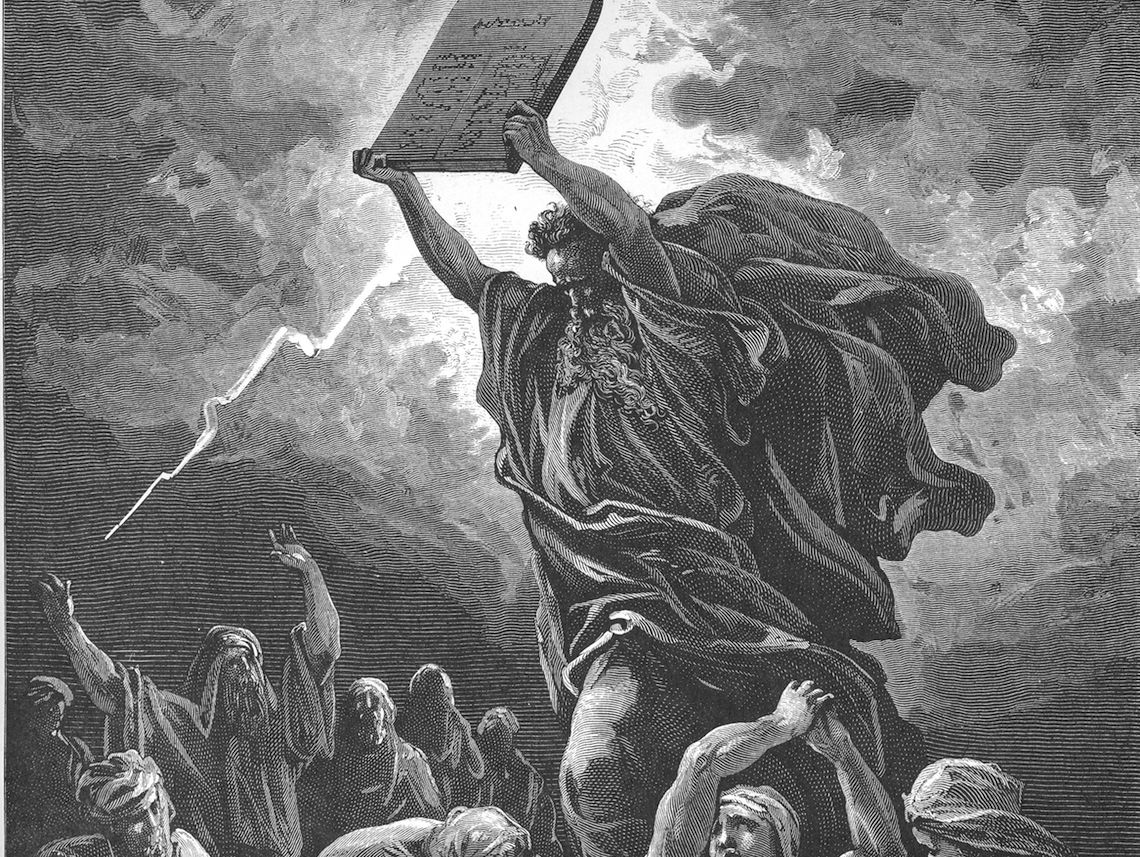
Parashat Ki Tisa (Exodus 30:11-34:35)
“[Moses] hurled the tablets from his hands and shattered them … ” — Exodus 32:19
The shattering of the Ten Commandments in this week’s parsha after Moses finds the Israelites with the golden calf is the shattering of trust. Think of a moment when your trust was broken. Do you remember the pain of betrayal, when the covenant carved into stone that you thought was solid and eternal was all at once demolished?
Of course you do. No one forgets.
I believe that trust is a delicate compound of truthfulness and tenderness. And today, we are sorely lacking in both elements.
Truth is delicate. It is a fabric easily stretched and torn. And it is becoming increasingly difficult to identify the true fabric of truth amid so many well-crafted synthetics. We are surrounded by what Stephen Colbert calls “truthiness,” which he defines as something that a person making an argument claims to know intuitively “from the gut” or because it “feels right” without regard to evidence, logic, intellectual examination or facts.
Photos are filtered. Bodies are nipped and tucked. Resumes are enhanced. Diplomas are doctored. Reality shows are staged. Facts are altered. We live in an era when more than speaking truth to power, we ache for power to speak truth.
And yet, the truth, too, can be brutal. In Paul Simon’s song “Tenderness,” he sings: “You say you care for me, but there’s no tenderness beneath your honesty/ You don’t have to lie to me, just give me some tenderness beneath your honesty.”
The rabbis say that in order to preserve shalom bayit, peace in the home, every now and then a small fib is OK. In fact, Talmud gives examples of when it is preferable to lie. What does one say to a bride? Even if she is lame and blind, one is to say how graceful and beautiful she is. I would argue that shalom bayit is not about dishonesty. It’s about delivering truthfulness on a cushion of tenderness. You might think the bride is unattractive, but her partner doesn’t, and when we learn to perceive through loving eyes, we are elevated.
Truthfulness plus tenderness equals trust.
In the Talmud, Rava, who lived around the year 300, said: At the hour you enter heaven for judgment, they will ask you, “Nasata v’natata b’emunah?” (“Did you deal honestly with people in your business?”)
There are systems in this world, many, where dealing honestly with one another is not a high priority. Where girls are offered jobs overseas and then are lost in the sex trade. Where bribes corrupt organizations and obstruct every avenue toward justice. Where everyone and everything is for sale, and no one is safe.
And yet, we are a network, a symbiotic relational push-and-pull, give-and-take system. We are all in the same boat, and if I drill a hole under my seat, it affects you. We are connected. Everything depends on trust.
Every time we drop off our kids at school, we trust that they are in caring hands. Every time the light turns yellow, we trust that cars are going to slow to a stop. Every time we make a deposit, we trust our money is safe.
Too much trust can be dangerous — we would be foolish to trust everyone. But trustworthiness is not dangerous. To be on time, respect boundaries, act with sincerity, deliver honesty with tenderness, create safe environments, keep confidentiality — these are what make you trustworthy, sought after, admired and adored.
So while Rava did not say to trust everyone, and he didn’t promise that everyone else will have honest weights and measures, he said you need to be trusted. You have to have honest weights and measures. Success depends on how much you’ve cultivated other people’s trust in you.
On our dollar bill it reads: “In God we trust.” The touchpoint of our entire network of exchange reminds us that we are bound to a trusteeship with God, that our life is our true asset, our breath is our capital, our soul is our fortune.
God leases everything to us. The Torah is the Deed, which we seal with our good deeds, and our good deeds inspire others and accumulate interest. For some God-knows-why reason, God sees trustworthiness in us, and God appoints us the trustees of this supreme gift.
This despite the fact that the shattered shards of trust are scattered all around us. And as we all well know, it takes a lot of time, patience and stamina to put trust back together. Even after new covenants are at last established, we still each carry those broken bits with us.
Moses says in our Torah portion, “Pardon our iniquity and our sin, and take us for Your own!” (Exodus 34:9). The Israelites built the golden calf because they did not have enough trust in God, and afterward, they had to work hard to regain God’s trust. May truthfulness and tenderness inform our relationships with one another and with God.
Rabbi Zoe Klein is senior rabbi at Temple Isaiah.

































 More news and opinions than at a Shabbat dinner, right in your inbox.
More news and opinions than at a Shabbat dinner, right in your inbox.